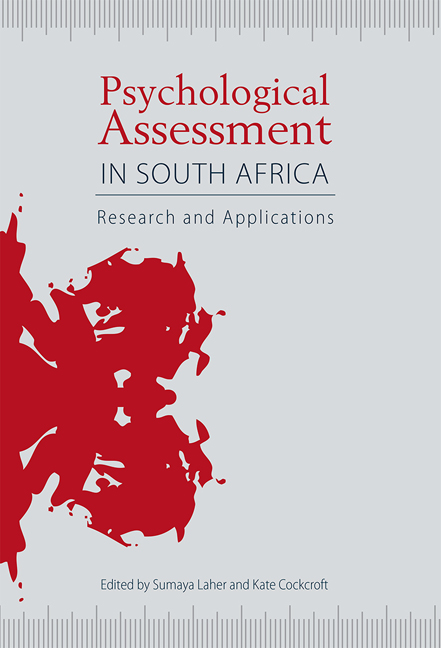Book contents
- Frontmatter
- Contents
- Tables and figures
- Acknowledgements
- Acronyms and abbreviations
- 1 Contextualising psychological assessment in South Africa
- Section One Cognitive tests: conceptual and practical applications
- Section Two Personality and projective tests: conceptual and practical applications
- 14 The Sixteen Personality Factor Questionnaire in South Africa
- 15 Using the Fifteen Factor Questionnaire Plus in South Africa
- 16 The Basic Traits Inventory
- 17 The Myers-Briggs Type Indicator® in South Africa
- 18 The NEO-PI-R in South Africa
- 19 Using the Occupational Personality Profile in South Africa
- 20 The Occupational Personality Questionnaire
- 21 The Millon Inventories in South Africa
- 22 Assessment and monitoring of symptoms in the treatment of psychological problems
- 23 Assessment in routine clinical and counselling settings
- 24 Projective assessment of adults and children in South Africa
- 25 The use of the Children's Apperception Test and Thematic Apperception Test in South Africa
- 26 Projective assessment using the Draw-A-Person Test and Kinetic Family Drawing in South Africa
- 27 The Rorschach in South Africa
- Section Three Assessment approaches and methodologies
- Contributors
- Index
14 - The Sixteen Personality Factor Questionnaire in South Africa
from Section Two - Personality and projective tests: conceptual and practical applications
Published online by Cambridge University Press: 21 April 2018
- Frontmatter
- Contents
- Tables and figures
- Acknowledgements
- Acronyms and abbreviations
- 1 Contextualising psychological assessment in South Africa
- Section One Cognitive tests: conceptual and practical applications
- Section Two Personality and projective tests: conceptual and practical applications
- 14 The Sixteen Personality Factor Questionnaire in South Africa
- 15 Using the Fifteen Factor Questionnaire Plus in South Africa
- 16 The Basic Traits Inventory
- 17 The Myers-Briggs Type Indicator® in South Africa
- 18 The NEO-PI-R in South Africa
- 19 Using the Occupational Personality Profile in South Africa
- 20 The Occupational Personality Questionnaire
- 21 The Millon Inventories in South Africa
- 22 Assessment and monitoring of symptoms in the treatment of psychological problems
- 23 Assessment in routine clinical and counselling settings
- 24 Projective assessment of adults and children in South Africa
- 25 The use of the Children's Apperception Test and Thematic Apperception Test in South Africa
- 26 Projective assessment using the Draw-A-Person Test and Kinetic Family Drawing in South Africa
- 27 The Rorschach in South Africa
- Section Three Assessment approaches and methodologies
- Contributors
- Index
Summary
Extensive literature exists in psychology on understanding and assessing personality. This chapter cannot even begin to do justice to such contributions. Suffice it to say that the Sixteen Personality Factor Questionnaire (16PF®) originated from the so-called trait or factor theories of personality. Early proponents include USA and English pioneers such as Eysenck, Allport and Spearman. According to these theories, rational, objective and mostly quantitative evidence and explanations, and not therapeutic or clinical experience or animal studies, underpin and account for a broad and complex understanding of human behaviour. Instruments such as the 16PF questionnaire have endeavoured to measure and assess underlying personality structures and dimensions within a holistic notion of motivation, predictability and behaviour. Interested readers can consult ‘classical’ sources on the origins of the 16PF questionnaire and its theoretical and empirical underpinnings produced by people such as Hall and Lindzey (1957), Hjelle and Ziegler (1976), and the father of the 16PF himself, Raymond B. Cattell (Cattell, 1989; Cattell, Eber & Tatsuoka, 1970). Recent developments and literature relating to the same themes come from the rapidly expanding field of cross-cultural studies and assessment.
In this chapter the 16PF questionnaire is described and detail is given on the current version of the questionnaire, the 16PF Fifth Edition (16PF5). In considering the history and development of the 16PF in South Africa, earlier versions are mentioned to contextualise the development of the 16PF5 (the only version presently available). Psychometric properties of the latter are also presented. A detailed discussion follows on the cross-cultural research with the 16PF South African 1992 version (SA92) that formed the basis for continued work with the 16PF5. The chapter concludes with discussion of the 16PF in practice, and consideration of the future of the 16PF internationally and in South Africa.
A description of the 16PF
The 16PF is a trait-based measure of normal personality that provides a picture of personality through 16 primary factors and 5 higher-order factors. The rationale for using the 16PF is that a questionnaire developed and structured on the basis of personality traits that had been identified in a scientific manner from a large number of (everyday) personality descriptions should provide a reliable and valid measurement of an individual's true personality. Once obtained, such a picture would enable the trained, qualified and experienced psychologist to understand and predict an individual's behaviour in a consistent manner.
- Type
- Chapter
- Information
- Psychological Assessment in South AfricaResearch and Applications, pp. 203 - 217Publisher: Wits University PressPrint publication year: 2013



